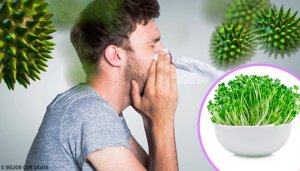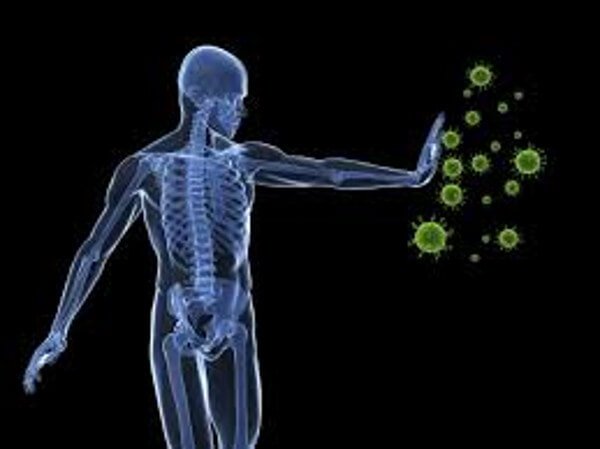6 Benefits from Eating Alfalfa


Written and verified by the nutritionist Eliana Delgado Villanueva
Alfalfa can help improve our overall health. It is rich in iron. Therefore, it is ideal for anemia and iron-deficiency. Alfalfa is a pea family plant often used as fodder. However, due to its nutritious values, it gained popularity as food and is useful for medicinal purposes.
All plant parts are usable for human consumption:
- The flowers are used for tea.
- The leaves are used for alfalfa juice, among other things.
- The sprouts are a delicious salad ingredient.
- The root helps control fevers in traditional Chinese medicine.
- Moist ground seeds relieve annoying insect bites.
What are its properties?
In other words, alfalfa is complete food because it contains:
- Vitamin A, helps the lungs and heart function properly.
- Minerals (magnesium, calcium, iron, and selenium) are essential for vital bodily functions.
- Vitamin C, has an antioxidant effect and is necessary for making collagen.
- Proteins, some studies suggest that alfalfa may be useful in fighting against some types of cancer.
- Vitamin K, is indispensable for blood coagulation.
What are the benefits of regular consumption?
Asides from benefittin from its nutritional values, by including alfalfa in our diet, we obtain the following seven health benefits:
1. Strengthens immune system

This food stimulates the immune system, and optimizes its reaction to viruses and bacteria.
Eating alfalfa sprouts is the best way to enhance this benefit because you also consume glucosinolates, which are compounds with cancer fighting properties.
2. Detoxifies the body
Thanks to the urinary and digestive systems´ regulatory properties, alfalfa is ideal for ridding the body of toxins. It also helps treating kidney failure and gastric ulcers.
3. Prevents anemia

In addition to nutritional properties, alfalfa does not only help prevent but also fight against iron-deficiency anemia, due to its high iron content.
4. Relieves menopause symptoms
This is due to the phytoestrogens contained in alfalfa, which raise estrogen levels in the body. Also, its consumption is recommended to avoid menstrual cramps.
5. Decreases the risk of cardiovascular diseases

According to a 2008 study, a diet that includes alfalfa on a regular basis can help reduce bad cholesterol (LDL) levels within arteries.
6. Improves skin health
This food is perfect for beautiful and radiant skin due to its high content of antioxidants and coumarins. Additionally, it helps fight against cellulite.
How to include Alfalfa in your diet?

Alfalfa leaves can be cooked and eaten with green leafy vegetables, such as spinach and chard. Likewise, you can make delicious refreshing juices.
Ingredients
- ½ cup of alfalfa leaves (75 g)
- ½ of a squeezed lemon
- 4 cups of water (1 liter)
- Honey (for flavor)
Utensils
- Blender
Preparation
- Place the alfalfa leaves and lemon with water in the blender.
- Blend for three minutes. Add honey and mix again.
- Serve and enjoy.
Alfalfa sprouts are also an excellent option for makings salads or having them as a sandwich ingredient. Plant them at home if you cannot get them at your local market.
What do you need?
- A container at least 9 cm wide and 15 cm high.
- A thin piece of cloth to cover the container.
- A rubber band.
- 1 cup of water (250 ml)
- 1 tablespoon of alfalfa seeds (10 g)
What should you do?
- Place the seeds in the container and have them soak for three hours.
- Cover the container with a cloth and rubber band.
- Drain the water and place the container in the sun.
- Continue for a week. Move the container occasionally to prevent sprouts from tangling.
- To consume, just rinse and disinfect.
When should you not eat it?
Despite all benefits, there are cases in which it is better to prevent eating alfalfa:
- Do not consume during pregnancy and lactation because it interferes with estrogen.
- It is not recommended while taking anticoagulant drugs.
- Its consumption is discouraged for autoimmune disorder patients.
- People with gout or high uric acid should stop eating alfalfa due to its high purine content.
Always remember to talk to a specialist before taking or applying any remedy if you have any medical conditions and doubts about eating alfalfa or any other food.
All cited sources were thoroughly reviewed by our team to ensure their quality, reliability, currency, and validity. The bibliography of this article was considered reliable and of academic or scientific accuracy.
- Al-Dosari, Mohammed. (2012). In Vitro and in Vivo Antioxidant Activity of Alfalfa (Medicago sativa L.) on Carbon Tetrachloride Intoxicated Rats. The American journal of Chinese medicine. 40. 779-93. 10.1142/S0192415X12500589.
- Amaro, Jony & Iparraguirre, María. (2018). Efecto del consumo de extracto de alfalfa (Medicago sativa L.) sobre el recuento de leucocitos, en ratones (Mus musculus). Revista Medica Herediana. 29. 97. 10.20453/rmh.v29i2.3349.
- Seida, A., El-Hefnawy, H., Abou-Hussein, D., Mokhtar, F. A., & Abdel-Naim, A. (2015). Evaluation of Medicago sativa L. sprouts as antihyperlipidemic and antihyperglycemic agent. Pakistan Journal of Pharmaceutical Sciences, 28(6), 2061–2074.
- DeLoughery, T. G. (2017, March 1). Iron Deficiency Anemia. Medical Clinics of North America. W.B. Saunders. https://doi.org/10.1016/j.mcna.2016.09.004
- Seida, A., El-Hefnawy, H., Abou-Hussein, D., Mokhtar, F. A., & Abdel-Naim, A. (2015). Evaluation of Medicago sativa L. sprouts as antihyperlipidemic and antihyperglycemic agent. Pakistan Journal of Pharmaceutical Sciences, 28(6), 2061–2074.
- De Leo, V., Lanzetta, D., Cazzavacca, R., & Morgante, G. (1998). [Treatment of neurovegetative menopausal symptoms with a phytotherapeutic agent]. Minerva Ginecologica, 50(5), 207–11. Retrieved from http://www.ncbi.nlm.nih.gov/pubmed/9677811
- Asgary, S., Moshtaghian, J., Hosseini, M., & Siadat, H. (2008). Effects of alfalfa on lipoproteins and fatty streak formation in hypercholesterolemic rabbits. Pakistan Journal of Pharmaceutical Sciences, 21(4), 460–464.
This text is provided for informational purposes only and does not replace consultation with a professional. If in doubt, consult your specialist.








